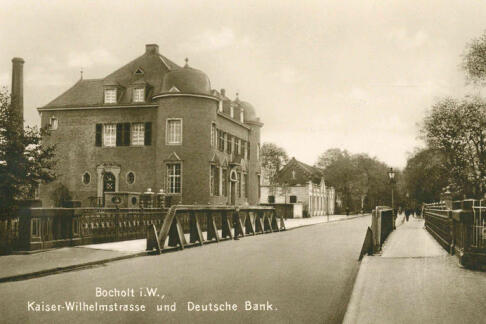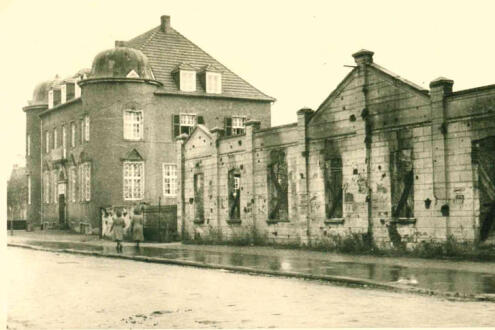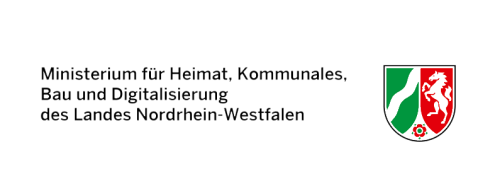Café Eilers
The viewer is in Neustraße looking south. After the bridge, Kaiser-Wilhelm-Straße began at that time, today the road leads into the street "Am Neutorplatz". On the left is the Deutsche Bank building, built in 1923, which became Café Eilers after the Second World War.
The café had a pastry shop and a restaurant. In addition to its function as a cultural centre, Café Eilers was also a meeting place for many Bocholt clubs. Next to it is the former office, warehouse and office building of the mechanical weaving mill of the widow P. Willemsen, which was destroyed by fire in 1908. During the First World War, the municipal war kitchen was housed there. The factory chimney towering on the left of the picture also belonged to the aforementioned textile company.
The Aabrücke bridge with iron parapet in the foreground was built in 1894 in place of a wooden river crossing. Damaged in the last war, it was completely rebuilt in 1968/69.
The building was demolished in 1969
The photo shows Café Eilers on what was then Kaiser-Wilhelm-Straße, which was demolished more than 50 years ago. The imposing brick building with two slightly protruding corner towers was designed in 1922 by Cologne architect Emil Felix as a branch for Deutsche Bank, which leased the building to innkeeper Bernhard Matschke after the war.
In 1932, Matschke had taken over the "Café Eilers" founded by Josef Eilers in the 19th century. However, this residential and commercial building at Neustraße 22 was completely destroyed in the bombing raid on Bocholt on 22 March 1945, which is why he sought a spacious, centrally located and intact replacement. As the Deutsche Bank building had survived the war relatively well apart from a few splinter impacts in the façade, roof and window damage, and the bank itself refrained from reopening its branch there, Matschke's "Café Eilers" was able to celebrate its reopening in Kaiser-Wilhelm-Straße on 14 August 1948 after some repair work.
Just like the old business premises, the new establishment also gained a high reputation and became one of the most renowned establishments in the city and beyond. The café, patisserie, restaurant and hotel were not just a centre of attraction for regular café guests. The establishment, which was idyllically situated on the River Aa, became an event centre for concerts, international fashion shows and club meetings. Famous actors who performed in the Lichtburg theatre opposite were also among the guests.
After the death of tenant Bernhard Matschke in 1957, his widow continued to run the hotel and catering business. At the end of the 1960s, however, Karstadt AG planned the construction of a new department stores' in Bocholt, which was also to extend to the Café Eilers site.
The new implementation of this construction project ended the history of the renowned store in April 1969, and the new Karstadt branch opened in its place on 25 June 1970.
In this audio recording, Jewish city councillor Jeanette Wolf talks to a work colleague about the situation of working-class women in Bocholt around 1920.
Sources of the audio files
The situation in which Jeanette Wolff wanted to take part in a budget consultation while heavily pregnant:
- Birgit Seemann, Jeanette Wolff. Politikerin und engagierte Demokratin (1888-1976), Frankfurt/New York 2000 (Campus Judaica, 16), p. 27.
On Jeanette Wolff's family background and children:
- Birgit Seemann, Jeanette Wolff. Politikerin und engagierte Demokratin (1888-1976), Frankfurt/New York 2000 (Campus Judaica, 16), pp. 11-19.
On Jeanette Wolff's political and social offices and activities:
- Birgit Seemann, Jeanette Wolff. Politerin und engagierte Demokratin (1888-1976), Frankfurt/New York 2000 (Campus Judaica, 16), pp. 25-26.
On Jeanette Wolff's commitment to women's welfare:
- Christiane Eifert, Die Generation Jeanette Wolffs in der Sozialdemokratie der Weimarer Republik, in: Bernd Faulenbach (ed.), "Habt den Mut zu menschlichem Tun". Die Jüdin und Demokratin Jeanette Wolff in ihrer Zeit (1888-1976), Cloppenburg 2002, pp. 61-74, here p. 63.
On the maximum working hours for women:
- Eduard Westerhoff, Zeit des Umbruchs. Time of upheaval. Beiträger zur Bocholter Sozialgeschichte der Kaiserzeit, Bocholt 2003 (Bocholter Quellen und Beiträge, 12), p. 161.






